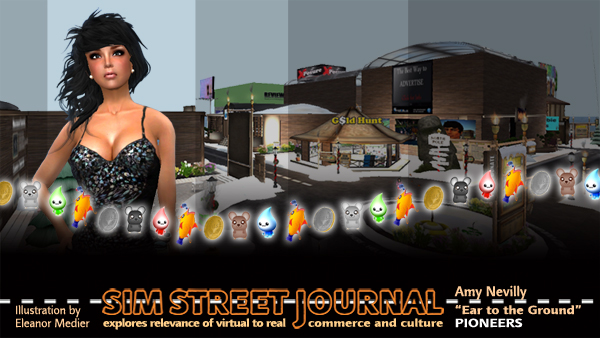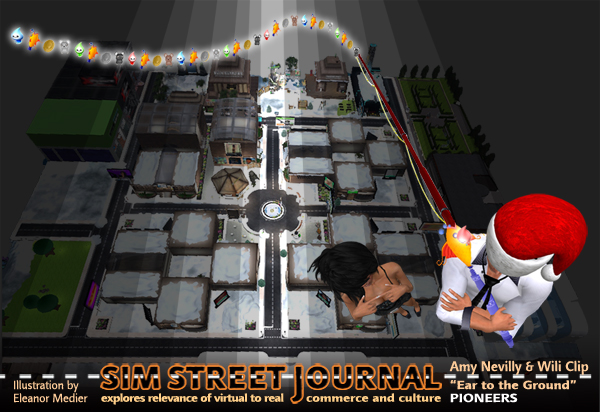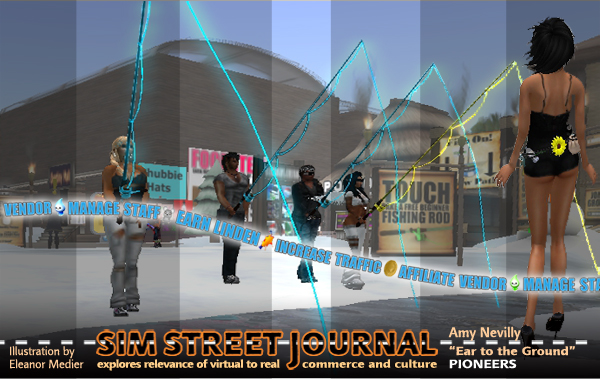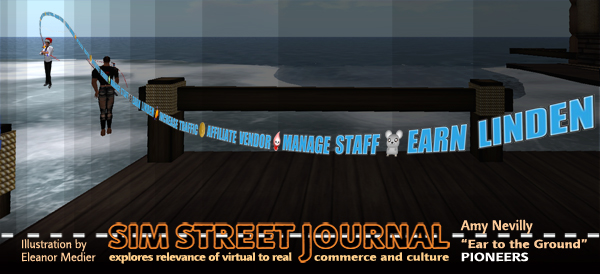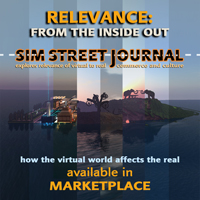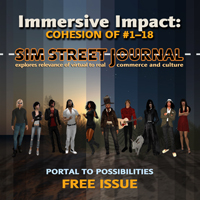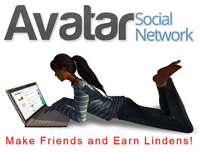Ear to the Ground by Amy Nevilly
Games are about psychology. People sitting in front of screens need to find stimulation, or they get bored. (The same applies to movies and TV shows.) Second Life® attracted me as a long-time gamer—I am a huge fan going back to childhood. I played Ultima Online, one of the very first MMOs (Massive Multiplayer Online).
As I grew, the monetary side interested me more and more. SL offered the possibility of greater RMT (Real Monetary Transactions). The economics and the interactions between people that take place have always fascinated me.
Working in Second Life® is my real life job. My early years were quite academic, as I have two degrees—engineering and management. For five years, I worked as a consultant for an engineering company. However, my real passion was always, and continues to be, for creativity and entrepreneurship.
My first job in SL was having a mall and jobs agency, which were moderately successful. Wili Clip, CEO of our company, had visited my land and was impressed with my skills. We discussed how there were very few ways for players to earn linden without using credit cards. Often, new players who seek jobs get sucked into the adult industry. It’s not that I have a problem with the adult industry, but it puts off many people who then leave. Wili and I saw that there had to be an alternative, and so we worked hard to provide it.
Quickly, I realized that there was more to be earned in content creation. The mall eventually just dropped off my priority list. Our grid-wide advertisement network came first, and then we developed our games.
All of our business units are essential to our success. It’s not possible to pick one part that is most important. Each one is connected in some way. Our advertisement networks are used to promote our games, and so forth. But these appeal to two different markets. I have learned how people currently operate in SL, and how they should.
Many of our players would have quit SL long ago if it was not for our games.
An entrepreneur in SL should not think about how to make money from SL. They should instead think about how to grow SL, and make some money in the process. Whether that is through helping new players, or simply enriching the standard of 3d design—that should always be what is in their minds. It’s like this: If entrepreneurs don’t grow SL, then they shrink it. There are two different groups in SL—those here to have fun and those here to do business. The key is to make peoples’ SL experiences more pleasant ones. People who come here to take advantage of players really anger me. They get a one time payoff, and quit. This hurts all businesses.
There are about 1000 people who earn a living in SL. How people make that living has shifted. In the past, many people made a lot of money in the land business. Then they were replaced by designers, whom you won’t see online very much. The money evolved from renting out land in a land bubble, to creating valuable content. To be a content creator, you have to be a talented designer. Much of that work is in 3D software, Photoshop, and so forth. It is a very good way to make a living. The problem is, a lot of people try to do small bits of work and move on quickly. But, you really have to develop a large range of products under one brand and work constantly to improve them.
There is not one thing that is key to achieving success. You have to do everything right. And you must have the energy to work twice as hard as anyone else.
Develop your own brand and range of products. Work with people. Combine your skills and make something that is harder—a unique product that no one can easily emulate. It is called a ‘barrier to entry.’ Mass appeal also helps. You want something you can sell over and over again. Otherwise you will burn yourself out—unless you can charge a small fortune.
It is hard to keep a balance and to do everything. We were stretched at one point—natural growth pains. Currently we have a team of about 20, including some of the best scripters and designers in SL.
To develop new products is a very slow process. We might spend months just talking about an idea. We sleep on it, gather thoughts, and then start over again. Often you can get an idea and it will seem amazing, and then you wake up the next morning, and your brain sees it from another angle.
The most common mistake business owners make is trying to copy or clone the ideas of others. But, customers only get excited about new things, not things they have already seen or experienced. Remember that to create an original idea is free.
We are successful because we came up with original ideas, and worked hard to evolve them. People can see that. Come up with an original idea and then pour your talent and passion into it, and you’ll achieve success. Being original is very easy. You just have to learn to think differently. You have to develop a questioning mind.
Question everything, and very soon you’ll see gaps in the market big enough to walk an elephant through. Look for truly original ideas. Finding entrenched competition is a huge turn off for me if I think about entering a market, e.g. Google Ads. To break into a market just with the idea of doing something better is not enough, unless there is meek competition. You would need a disruptive technology to succeed against stiff competition, such as smart-phones.
My greatest reward is to see a business make a profit without my input. I work hard to develop and refine a product.
Entrepreneurs must evolve, and we live by our wits. Therefore, I think about what businesses to establish long term—five years ahead. Any commitment takes about 3-4 years to become established enough to draw an income. Long-term, we learn from units we run, and take that experience into new ones.
“We constantly improve our organization and expand our business. My greatest challenge is to keep everyone happy, and find free time for myself—the perfect balance.”—Wili Clip
Most of my time is spent helping customers in chat windows. It is important to always be in contact with customers. We can lose touch, otherwise. We staff to maximize communications, by finding qualified people there to answer questions and handle most customer service. And when I develop a new product, I use them more to cover for me.
Often I help those playing the games—I like to understand what players need. Customers also like to feel respected. There’s nothing better than having a CEO or MD coming to talk to you personally to fix what is a tiny issue you have. This contact also helps in our development of new concepts.
Prioritizing the different initiatives is a major challenge. We have about five different projects in active development, and maybe ten more in the conceptual stage. All are totally new to the SL scene. I have short-term ones to improve customer experience. I have medium- term ones, such as developing new products. And, I have long term ones that involve portalling out of SL into new businesses, entirely. SL will not last forever.
Listing with CapEx has been a mixed bag. We get some great publicity. But, at the same time, we also get drama—uninformed accusations, and criticisms from shareholders. To open books and be totally transparent, investors have to respect that a business cannot disclose everything for public viewing. Many on CapEx think that a company should be run by committee. Yet, we would be stupid not to listen to input. Shareholders have some valuable input. Taking criticism is the best way of improvement. But at the end of the day, we are here to lead this company, and we know what is best for it, overall.
“Growing a business in virtual life is like growing one in real life, except that you don’t have to commute to a workplace. In SL, a business starts on a smaller scale, with minimum risks, and little or no initial capital. But like real life, you must develop real business and professional skills, educate yourself daily, and grow as a person. I’ve learned everything about business here. SL is the street to gain needed practical knowledge.” —Wili Clip
What I have learned the most about business in SL, is that skills are everything. To succeed, an entrepreneur has to be constantly learning. I can do graphic design, 3d design, scripting, web design, management, and have other capabilities that are needed to run a business. But even this is not enough, and I am constantly being forced to improve. Not only is a range of skills needed, there needs to be quality performance in all of them, unfortunately. We have to sell quality to customers, or they won’t want to buy it. Also, having a range of skills protects from too many people entering the market to compete. So essentially, an entrepreneur has to be everything at once. Pooling skills with partners can help, though that may have problems of trust.
“To succeed, invest a lot of time into your ideas and evolve your skills. You will learn from your own mistakes, but if you can, develop some analytical skills, to learn from the mistakes of others. Opportunities lie in every corner. Connect with other people, and surround yourself with talent; communities and social connections play a big role in business. Think a lot, be fair, and operate with a high moral stance.” —Wili Clip
Those new in business need to manage overhead, if wanting to last. Expensive overhead can be poisonous. If something is costing money, be ruthless in cutting it out. There is no room for emotional attachment. But “ruthless” is the wrong word— it connotes being mean and unfeeling. Instead, just be emotionless in decision making. For example, I loved my mall. I worked hard on it—hundreds of hours! But I returned it to my inventory, and abandoned my land. It had served its purpose. I made the right business decision. It was very hard to do, but it had to be done. I have no regrets. Use emotions when they are a help— such as when creating new ideas. Block them out when they are a hinderance—such as when spending money regularly.
Most people have no idea the huge impact SL has already had on the outside mainstream business world. SL was probably the first game with RMT systems, and at one stage had 50% of the entire virtual goods market. RMT is now taking over the whole gaming industry, and companies like Zynga are IPOing for billions of dollars on the basis of selling virtual goods to game players. Many of the original creators of SL have moved on to companies like Google, and such. That doesn’t make SL any less of an achievement for its time, and the impact of it cannot be underestimated.
SL is a stage in evolution. Nothing starts a momentum—ideas develop and evolve. Wili and I are gaming industry professionals. We’re very connected and involved with other gaming industry people. SL is still a great environment for developing ideas. This is the value it will continue to have.
SL has changed me as a person. I’ve always been an entrepreneur, but this is a fantastic sandbox to refine skills and thinking. We discover ourselves.
– – – – – – – – – – – – – – – – – – – – – – – – – – – – – – – – – – – – – – – – – – – – – – – – – – – – – – – –
(Please see the in-world release for more photographs, articles, and functionality).
Published monthly in complimentary versions: in-world and online.
Contributions are encouraged if covering topics relevant to the real world readers.
Comments and opinions are also encouraged.
– – – – – – – – – – – – – CONTACTS:
Sim Street Journal explores the relevance of virtual to real commerce and culture.
ONLINE: https://simstreetjournal.wordpress.com/
FACEBOOK: https://www.facebook.com/simstreetjournal
IN-WORLD: http://maps.secondlife.com/secondlife/Innu/40/36/1650
MARKETPLACE: https://marketplace.secondlife.com/stores/148961
EMAIL: simstreetjournal@gmail.com
Sim Street Journal explores the relevance of second to first life.
© 2014 by Eleanor Medier, Sim Street Journal. Articles cannot be reprinted without permission.

